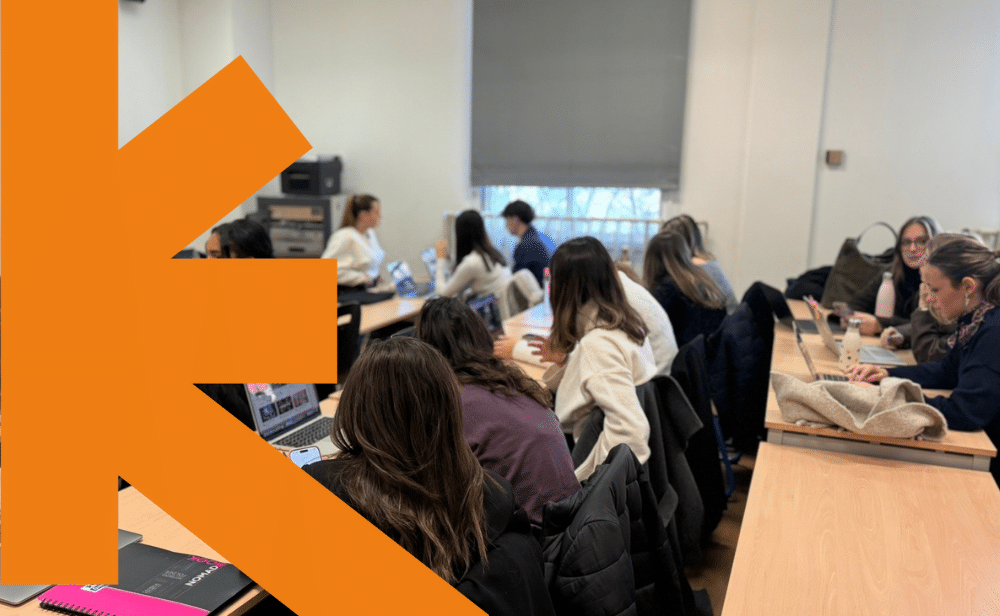

- Clermont School of Business
- International
- Study with us
- Programs
- Bachelor in International Management
- Bachelor in Digital Marketing & E-Commerce Management
- Master in Management
- Programme Grande Ecole online
- MSc – Master of Science Business Intelligence & Analytics
- MSc – Master of Science Corporate Finance and Fintech
- MSc – Master of Science Digital Marketing & Artificial Intelligence
- MSc – Master of Science International Commerce & Digital Marketing
- MSc – Master of Science Project Management
- MSc – Master of Science Procurement & Supply Chain Management
- Doctorate of Business Administration (DBA)
- Executive Education (French only)
- Discover the Master in Management majors
- International Students
- Summer School
- Tools & pedagogical support
- Programs
- Faculty & Innovation
- Company & Career
- News & Events
Pierre-Yves Bonamy: From Financial Expertise Within the MICHELIN Group to Teaching in Higher Education
In 2022, Pierre-Yves Bonamy, has been a MICHELIN Finance and Management Control Expert since 1985. He recently joined the Group’s skills sponsorship program and chose to return to teaching. Since the beginning of the school year, he has shared his knowledge with many students from ESC Clermont Business School.
A Rich and Varied International Career
In 1985 (after two years of teaching at the INSET of Yamoussoukro in Côte d’Ivoire), Pierre-Yves Bonamy joined the MICHELIN group and exercised various responsibilities in the fields of Finance and Management Control, in different sites around the world.
His first posting was in Brazil as treasury assistant, and in 1991, he moved to Japan to take up the position of financial director where he remained for six years. He then joined the Clermont headquarters to exercise responsibilities in internal audit and returned to Japan in 1999, to manage various negotiations (the pension fund in Japan to be shared between partners, the liquidation of a Group subsidiary in the Philippines, etc.). He later took over the financial management of the Africa Middle East region, then in 2007 that of the South America region, where he was based in Rio de Janeiro.
Back at the Group’s headquarters in 2013, Pierre-Yves served as head of the mergers and acquisitions team and then as head of management control methods before joining the ranks of ESC Clermont Business School as a Faculty-Practitioner (a full-time speaker, not holding a teaching position but who has the necessary expertise to transmit professional knowledge to students).
Today he is responsible for the Investment Management module for MGE2 students in the Audit Expertise Consulting course and the “Financial Reporting” and “Company Valuation” courses for MGE 3 finance majors. He also teaches elementary financial accounting courses and a course specialized in the calculation of production costs to a group of bachelor students.
Interview with Pierre-Yves Bonamy
Together with DogFinance – the 1st professional social network in finance, banking, insurance, audit, and IT, we asked Pierre-Yves Bonamy some questions to find out more about his career and his motivations yesterday and today.

WHAT TYPE OF MISSIONS DID YOU HAVE AS A FINANCE PROFESSIONAL WITH THE MICHELIN GROUP?
During my first stay in Brazil, my main responsibility was to do operational research and develop methods to interpret accounting and financial statements in a context of hyper-inflation (15% or more per month!).
I then participated in various project teams to structure the financing of MICHELIN Group projects, particularly in Brazil, then in Asia: Thailand, Korea and then Japan, where I finally left in 1991.
There, I had two main responsibilities: first, the establishment of the funding necessary for the realization of an industrial investment (1991-1994) then the management of tax disputes with the local authorities relating to important flows of imports and exports from and to the United States, which ultimately resulted in the overhaul of the Group’s internal transfer pricing systems and their implementation.
In Africa and the Middle East, my missions were more varied: negotiations with the Algerian and French governments for the relaunch of the Group’s industrial site in Algiers, then setting up the necessary financing; management of the Port-Harcourt plant in Nigeria (financing and export flows); management of distribution or trade subsidiaries under “direct management” where marketing was carried out by importers.
In South America, my objective was to stabilize the financial balance of subsidiaries with complex flows (local production, imports, exports) in Brazil and Colombia, set up the necessary financing for planned expansions, and find financial solutions to the acute crisis in 2009 and 2010. It was also necessary to set up or reform distribution structures in countries where we had no industrial presence to optimize efficiency or to adapt to the extreme monetary phenomena we were facing (Venezuela, Argentina).
DID YOU HAVE TO TRAVEL DURING YOUR PROFESSIONAL EXPERIENCE? AND WHAT MOTIVATED YOU TO PURSUE THIS INTERNATIONAL CAREER?
Enormously! I absorbed a lot of long trips, often intercontinental, and reluctantly became an expert in managing jet lag! (Tip: there is no miracle solution, it takes patience and courage).
The interest for me was the opportunity to work in foreign countries and confront myself with very different cultural contexts: this is where we learn the most, about others, about ourselves, about oneself.
WHY DID YOU TURN TO TEACHING AFTER ALL THESE YEARS OF TRAVELING THE WORLD AND HOLDING KEY POSITIONS WITHIN THE MICHELIN GROUP?
After my secondary studies, I chose the ECG foundation program (At the time, the “HEC foundation program” was more well known). I then joined HEC in 1980, where I majored in finance. After graduating in 1983, I left as VSNE at the INSET of Yamoussoukro in Côte d’Ivoire: this is where I discovered teaching, in particular by providing a finance-accounting course for engineering students in their 5th year of studies at ENSIA. That was when I got my first taste of teaching!
I felt that my 33-year career and accumulated experience should not be wasted on continuing to feed Excel spreadsheets or PowerPoint presentations and that my knowledge should be passed on via teaching.
I have the great pleasure after all these years of experience to being able to go the opposite direction, rediscover the theory and be able to illustrate it with concrete examples experienced during my career.
IN YOUR OPINION, WHEN IT COMES TO TEACHING, WHAT ARE THE ADVANTAGES AND THE DIFFICULTIES?
Transmitting one’s knowledge requires a completely intellectual approach, seeing things from a different perspective, and at the same time, getting in tune with young people who expect a lot from their teachers.
The ability to illustrate such and such a rule through real-life situations or financial formula is certainly a plus: it enriches the course and makes it more concrete. The main difficulties from my point of view are twofold:
- Being able to identify the students’ level and what skills have already been mastered or still need to be acquired.
- Writing assessments and exam papers, where you need to judge exactly how demanding you can be, and know whether you are asking too much or too little: a delicate exercise when you lack experience…
This reinforces the admiration and respect I have for professional teaching colleagues!
Do You Know?
The MICHELIN Group’s skills sponsorship program is available to executives who are reaching the end of their career during their last months of activity.
The objective is to manage the transition from professional activity to retirement, by dedicating a few months to a personal project, in an approved associative environment.
Based on an associative structure, the ESC Clermont Business School has had the chance to welcome Pierre-Yves Bonamy since September. He gives our students the benefit of his highly specialized expertise and shares his professional experience with spontaneity and authenticity.
Related with

Stay updated with the latest news from Clermont School of Business by subscribing to our newsletter!
Merci ! Vous êtes maintenant abonné(e) à notre newsletter.
Vous recevrez dorénavant notre newsletter mensuelle.
@bientôt
We faced problems while connecting to the server or receiving data from the server. Please wait for a few seconds and try again.
If the problem persists, then check your internet connectivity. If all other sites open fine, then please contact the administrator of this website with the following information.
TextStatus: undefined
HTTP Error: undefined
Some error has occured.



